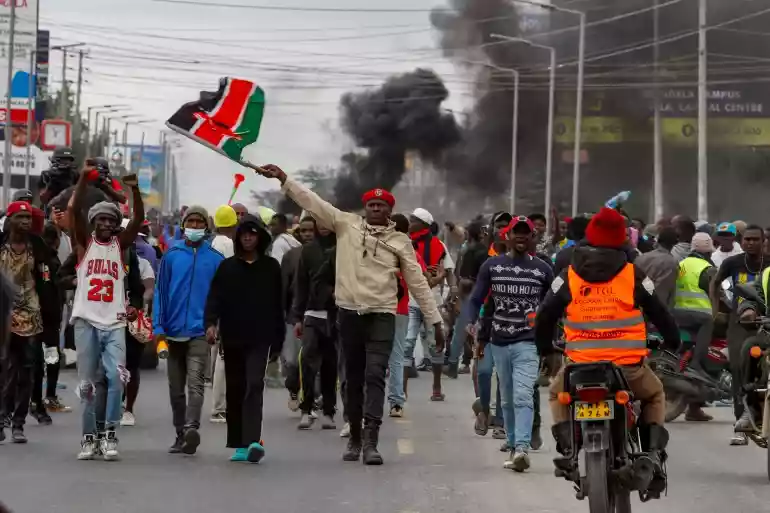
ACROSS Africa, a wave of civil unrest has engulfed multiple nations, exposing deep-seated grievances and systematic failures in governance that threaten the continent's stability and progress.
From the blood-stained streets of Nairobi to the barricaded hospital entrances in Johannesburg and the silenced halls of Zimbabwe’s universities, a pattern of governmental dysfunction and citizen desperation has emerged that demands urgent attention and comprehensive reform.
The situation in Kenya provides a stark illustration of how legitimate grievances can spiral into deadly confrontations when governments prioritise force over dialogue.
The death of blogger Albert Ojwang in police custody became the catalyst for widespread demonstrations that, according to the Kenya National Commission on Human Rights, resulted in 31 deaths — a figure that starkly contrasts with the official police count of 11 fatalities. The government's response, epitomised by President William Ruto’s directive to police to “shoot in the leg”, reveals a disturbing tendency among African leaders to view citizen protests as threats to be suppressed rather than expressions of democratic participation to be engaged with constructively.
This crisis of governance extends beyond Kenya's borders. In South Africa, the emergence of groups like Operation Dudula and the March and March movement, which have taken it upon themselves to deny foreign nationals access to healthcare facilities, represents a dangerous convergence of State failure and social fragmentation. As one Zimbabwean patient poignantly observed: “I would have left already because it's clear that they will not allow us in, but I want my clinic card because private health facilities require those. If they can give me my card, I will leave.”
This testimony underscores how the failure to address systemic challenges has created space for vigilante groups to violate constitutional rights under the guise of protecting national interests.
The situation in Zimbabwe’s universities, where students face suspension for protesting against a lecturer’s strike over paltry wages of US$230, further illustrates how authorities across the continent consistently prioritise suppression over substantive reform. Zinasu president Emmanuel Sitima’s characterisation of these actions as a “deliberate and systematic effort to criminalise dissent” points to a broader pattern of institutional failure to engage meaningfully with citizen concerns.
Economic apartheid compounds this political decay. Africa’s youth, who constitute over 60% of the population, face an existential paradox: they are told they are the future while being denied the present. In Kenya, where unemployment is at 35%, protests against regressive taxation exposed the raw nerve of generational theft — a system that extracts from the poor to subsidise the elite kleptocracy. South Africa’s clinic blockades, though morally indefensible, stem from a visceral truth: when a State fails to build enough hospitals, it inevitably pits the poor against the poorer.
- Lessons for media from Kenya elections
- Kenya's top court to rule on disputed presidential election
- Several injured in crush at Kenyan presidential inauguration
- Kenya election was an exemplary performance: Ruto
Keep Reading
The migrants scapegoated for overcrowded wards are merely collateral damage in a larger tragedy — the ANC’s betrayal of its liberation promises, where freedom now means the right to starve equally. Zimbabwe’s academic crisis epitomises this generational betrayal, where professors earn less than street vendors and students are punished for demanding education instead of indoctrination. These economies, rigged to benefit connected oligarchies, have become pressure cookers where legitimate grievances boil over into chaos.
The international community's role in this unfolding drama cannot be overlooked. The UN’s condemnation of Kenya’s use of “lethal ammunition” against protesters, while important, highlights the limitations of external pressure in effecting meaningful change. Real transformation must emerge from within African societies themselves, through the development of robust institutions capable of mediating social conflicts and ensuring equitable distribution of resources.
Historical precedents from both within and outside Africa offer valuable lessons. Ghana’s relative success in maintaining political stability through strong democratic institutions and peaceful power transitions provides a model worth studying. Similarly, Rwanda's economic reforms and anti-corruption measures, despite legitimate concerns about political freedoms, demonstrate how focused governance improvements can create conditions for social stability.
The unfolding crisis requires a fundamental reimagining of the relationship between African governments and their citizens.
This means moving beyond superficial reforms to address core issues of economic inequality, political representation and social justice. It requires creating meaningful platforms for dialogue where citizen grievances can be aired and addressed before they escalate into violence. Most importantly, it demands leadership that views protest not as a threat but as a vital component of democratic discourse.
The proliferation of protests across Africa reveals not just a crisis of governance but also a crisis of imagination in how to address citizen grievances effectively. The solution lies not in more sophisticated methods of suppression but in building genuine democratic institutions capable of channelling social discontent into constructive change. Until African leaders recognise that legitimate protest is a sign of democratic health rather than weakness, the cycle of demonstration and repression will continue to undermine the continent's progress towards genuine democratic governance. As such, the question facing African leaders today is not whether change will come, but whether they will help to shape it or be swept aside by it.










